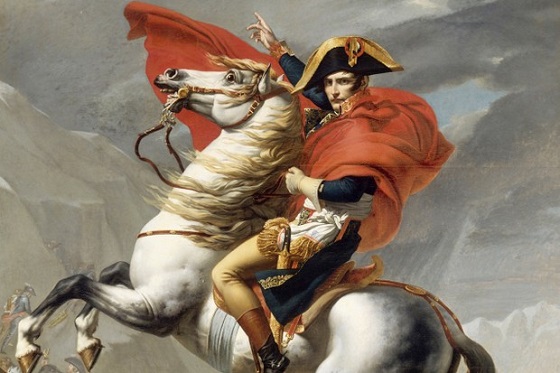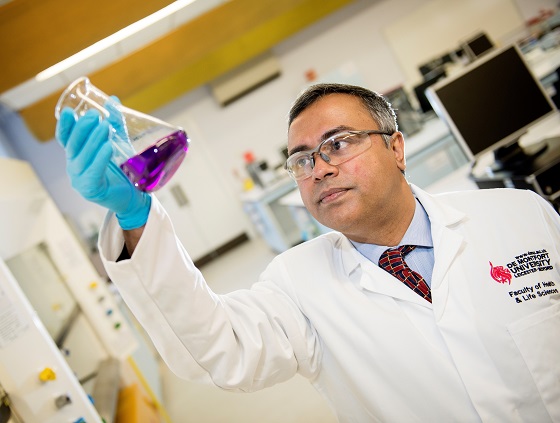After 200 years of conspiracy theories, a professor from De Montfort University Leicester (DMU) believes he can finally put to rest the question of who, or what, killed Napoleon Bonaparte - and it’s all down to the French emperor’s overindulgence in Eau De Cologne.
As today marks the 200th anniversary of the emperor’s death in exile, on the South Atlantic island of St Helena in 1821, Professor Parvez Haris says Napoleon inadvertently poisoned himself by smothering himself daily in two to three bottles of perfume over many years.

Did Eau de Cologne poison Napoleon Bonaparte?
Professor Haris, an expert in Biomedical Science and a Fellow of the Royal Society of Chemistry, will submit a research paper this week which says the essential oils in Napoleon’s favourite Eau De Cologne can explain many of the changes in Napoleon’s health, including his development of gastric cancer found during an autopsy by the Emperor’s British captors at the time.
His exposure to high levels of essential oils was not limited to Eau de Cologne. He regularly drank orange blossom water which also contains essential oil. Being from Corsica, he was fond of citrus fruits which are rich in essential oils but it is the abnormally high daily intake from Eau de Cologne that led to toxic effects.
Professor Haris says his evidence is the ‘elephant in the room’ that every medic and historian has missed for the past 200 years, and he is so sure of his findings he could back up the evidence ‘in any court in the world’.
Conspiracy theories about Napoleon’s death were rife from day one – and not just from his French supporters.
Some say he was poisoned by his captors, others say he absorbed vapours from wallpaper dyed with arsenic, while one theory is his body - which lies in a marble tomb in Paris – was swapped as Napoleon had escaped and started a new life in North America.
Professor Haris’s previously published research has revealed that certain types of rice carry dangerously high levels of arsenic because of where they are grown in the world and those consuming high quantities of rice are at greater risk of exposure to arsenic and developing disease.
He is also investigating how the world’s most prolific weed, the water hyacinth, can be put to practical use by filtering arsenic from water and so making it safe to drink.

Professor Haris says Napoleon used two to three bottles of Eau de Cologne a day
Professor Haris said: “Investigators have really missed the elephant in the room with the death of Napoleon. Many point to samples of Napoleon’s hair taken while he was still alive which had high levels of arsenic. But this theory has now been refuted since most people during Napoleon’s era had high levels of arsenic in their systems because of the arsenic containing medications and cosmetics they were using.
“What they have missed is the huge volumes of Cologne that Napoleon smothered on his body. He was surrounded by Eau de Cologne and on one occasion he had it smothered on his face and eyes mistaking it for water.
“Napoleon was a great promoter of Colognes which first went into commercial production in 1792. At that time it was only for the powerful and for the very rich and he could afford it. So for at least 20 years he was bathing his body in it, pouring it over his head and, in some cases, he was quite literally lapping it up. He took bottles with him during his military campaigns. Records show he was going through two to three bottles a day when, even now, people may use a bottle a year!
“For Napoleon Eau de Cologne was a double-edged sword. It saved him during his campaigns and travels but it ultimately killed him due to overdosing himself over several decades. Since it mainly contains alcohol, Eau de Cologne was acting as an antiseptic and this may well have saved his life by protecting him from catching deadly bacteria and viruses during his campaigns in different parts of Europe as well as in Asia (Syria) and Africa (Egypt).
"Although Napoleon did not like doctors and avoided their medications, he was convinced about the health benefits of Eau de Cologne and he is reported to have said that Eau de Cologne is 'a protection against many diseases'.
“So he was getting exposed to huge doses of essential oils of citrus fruits, lavender and other plants. Basically he was getting exposed to levels on a daily basis that others may reach in a year.”
Professor Haris’s arguments regarding the toxic effects of essential oils are supported by research from the USA National Institute of Environmental Health Sciences (NIEH) which have shown essential oils act as ‘endocrine disruptors’.
In a study published in the New England Journal of Medicine they showed that topical application of essential oil containing products led to boys developing gynecomastia which is a disorder where enlargement or swelling of breast tissue is seen in males.
Endocrine disrupting chemicals affects hormones and Professor Haris says there is written evidence of Napoleon developing breasts and having a hairless body. Napoleon was also reported to suffer from seizures which, according to the professor, may be again due to his elevated exposure to essential oils which recent research have linked to seizures.
He was reported to complain about feeling cold all the time and would lit a fire in his room even during summer. This suggests that he may have suffered hypothyroidism due to endocrine disrupting effects of the essential oils.
Finally, many years of exposure to excessively high concentrations of essential oil may have led him to develop gastric cancer. On the basis of animal studies, exposure to essential oil has been associated with the development of gastric cancer and recent research has provided evidence that endocrine-disrupting chemicals may cause gastrointestinal cancer.
Professor Haris said: “Napoleon, a great patron of science, slowly poisoned himself through overdosing with Eau de Cologne. It seems he was either not aware of, or did not care about, the famous dictum of the 16th century physician Paracelsus who stated that ‘What is there that is not poison? All things are poison and nothing is without poison. Solely the dose determines that a thing is not a poison’.
"There is no doubt in my view that Eau de Cologne was the main poison although co-exposure to other chemicals, including arsenic, must have contributed towards his ill health and ultimately his death from gastric cancer. ”
Napoleon Bonaparte was a French military and political leader. He rose to prominence during the French Revolution and, as Emperor Napoleon I, ruled over France, as well as parts of Europe and north Africa, for ten years.
He was famously defeated by British forces led by the Duke of Wellington at Waterloo in June 1815. He died in exile, under British guard, on the island of St Helena, on May 5, 1821. Napoleon remains one of the most controversial and celebrated political figures in world history.
Posted on Wednesday 5 May 2021